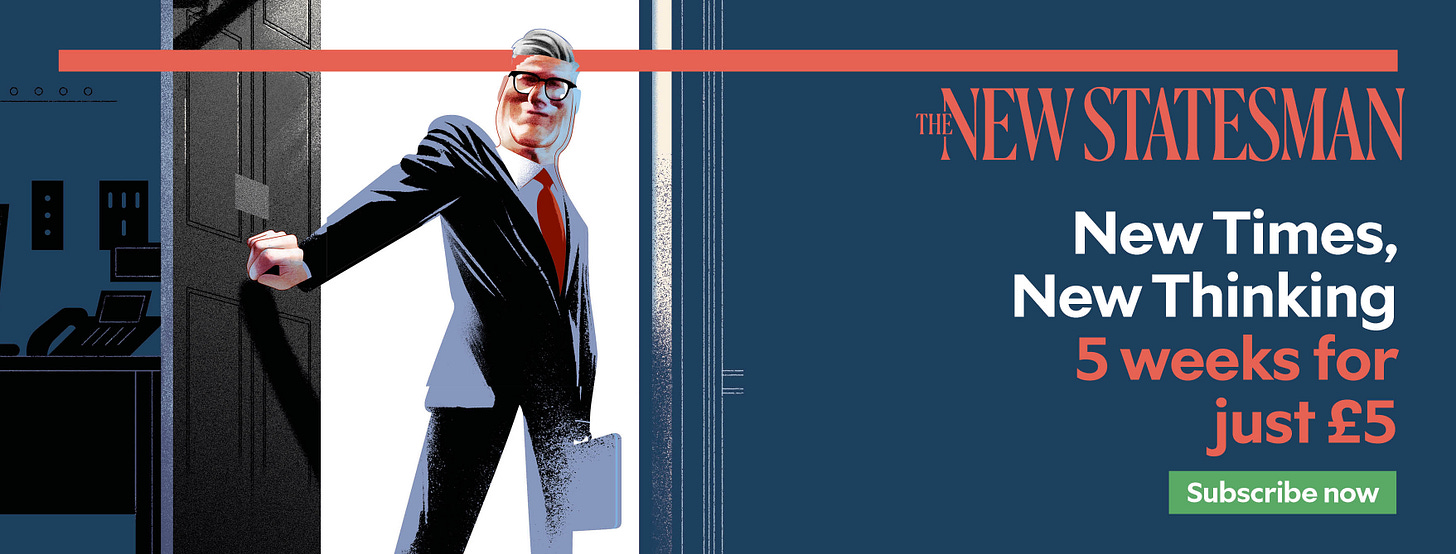Morning Call: Does Starmer’s purge have a purpose?
The removal of the whip from four more MPs risks advertising weakness rather than strength.
Good morning, it’s George here.
The parliamentary term is ending with high drama after four Labour MPs had the whip removed. Below I explore the thinking behind the move and the fallout in party circles.
The removal of the party whip was once an extreme tactic reserved for extreme circumstances. Take some of the rare examples under Tony Blair: George Galloway lost the Labour whip after he was accused of encouraging Iraqi insurgents to attack British soldiers and Fiona Jones received the same penalty after being convicted of electoral fraud (others, such as Ken Livingstone and Dennis Canavan, lost the whip by default after choosing to stand as independent candidates against Labour).
This was in spite of consistent parliamentary revolts under Blair: over the Iraq War (139 MPs), Trident renewal (95 MPs), university top-up fees (72 MPs) and, just five months into his premiership, over single-parent benefit cuts (47 MPs).
Keir Starmer, in one year and with a landslide majority, has removed the whip from 11 Labour MPs, more than Blair and Gordon Brown combined. Seven lost the whip last July for voting in favour of an SNP amendment backing the abolition of the two-child benefit cap and four yesterday suffered the same fate for their ringleader roles in the welfare rebellion: Neil Duncan-Jordan, Chris Hinchcliff, Brian Leishman and Rachael Maskell (three MPs, Rosena Allin-Khan, Bell Ribeiro-Addy and Mohammad Yasin, also lost their trade envoy posts).
Starmer allies are unrepentant. “These people were openly and publicly organising against the government whose programme they were elected to deliver,” one told me (three of the four whipless MPs were elected for the first time in 2024). “Government doesn’t work unless they feel the weight of rebelling against it in the flagrant way these guys did.”
No 10’s intent is clear: to send a warning to would-be rebels ahead of looming revolts over special educational needs reform and the forthcoming immigration bill. But the timing still stunned MPs – a few hours after the news broke they received a message from Parliamentary Labour Party chair Jess Morden wishing them a “relaxing break” ahead of the summer recess.
Starmer, MPs thought, had entered a more conciliatory phase of his premiership – more carrot and less stick (No 10 has spoken of “the need to bring people with us”). That’s certainly true for some: Starmer, criticised for spending too little time in parliament, yesterday had lunch on the terrace with six loyalists (Luke Akehurst, Lewis Atkinson, Jade Botterill, Lola McEvoy, Jake Richards and Mark Sewards). This, one MP suggested, was designed to send a signal that those who support the government will have their policy concerns heard (“you get more time with him if you do what’s asked”).
But Starmer’s approach to party management is still prompting unflattering comparisons among MPs. Blair, some note, endured numerous revolts but allowed rebels such as Jeremy Corbyn and John McDonnell to retain the whip even as they broke it numerous times. “Both Blair and Brown were relaxed because they were always confident that they could win the argument and didn’t need threats,” McDonnell, who lost the Labour whip last July, told me.
Others recall the tactics deployed by Dominic Cummings who removed the whip from 21 Conservative MPs in September 2019 after they sought to thwart a no-deal Brexit (which established the recent precedent of purging rebels). This was ruthlessness but for a clear purpose: removing all obstacles to the UK leaving the EU. The challenge for Starmer – after multiple U-turns – is that even sympathisers remain uncertain what his is. “There is no project,” said one. Until Starmer answers this charge, no amount of purges will strengthen him.
George’s picks
Andrew on why the Afghan data debacle is a humiliation of the British state – and its interventionist pretensions.
Steve Richards writes in defence of Richard Hermer and Labour’s other “incumbent insurgents”.
Oli Dugmore on why the war in Gaza is Gen Z’s Vietnam.
LabourList has an invaluable guide to the party’s new tribes and factions.
From our partners
Cybersecurity vendors are key in enabling organisations to place responsible disclosure at the core of their operations, writes regional director, UK & Ireland, at Fortinet, Richard Woolfrey.
Mailshot
Times: MoD hid Afghan leak from MPs
Politico: Starmer and Merz sign pact
Guardian: Resident doctors accused of “greedy” demands before Streeting talks
David Renton: What next for Palestine Action?
Patience Wheatcroft: Enquiries don’t work
Matt Zoller Seitz: The void behind Nicholas Hoult’s eyes
Brady Brickner-Wood: Justin Bieber’s improbable masterpiece
And with that…
Let me know what you think about today’s Morning Call by hitting reply. My thanks to Zoë Huxford and George Monaghan. Have a good day, Will Dunn will be with you tomorrow.
George — @georgeeaton









When I joined Labour in 1971 dissent was not just tolerated, it was celebrated as a sign of a party at ease with itself.
Now, it's no more 'big church', more follow the leader.
So, I'm heading off in search of shelter elsewhere.
Certainly no longer Labour. I miss the others.